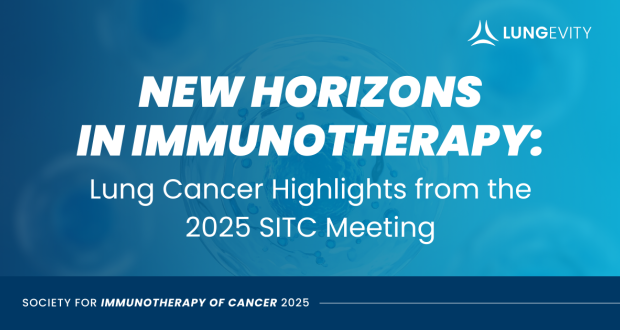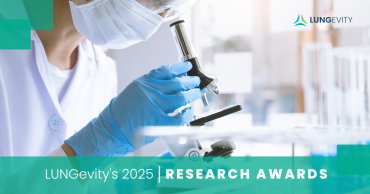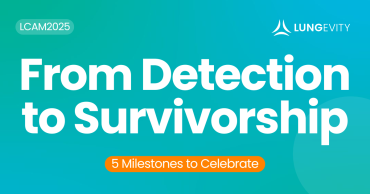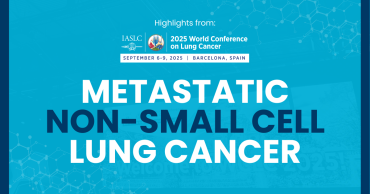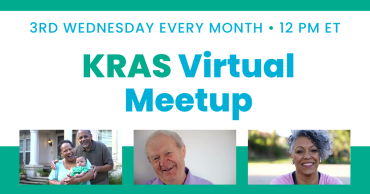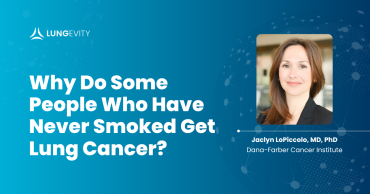News & Events
-
New Horizons in Immunotherapy: Lung Cancer Highlights from the 2025 SITC Meeting
The Society for Immunotherapy of Cancer (SITC) celebrated their 40th anniversary at their annual meeting in National Harbor, Maryland from November 5-9, 2025. The meeting focused on multidisciplinary...
-
The Future of Lung Cancer Starts Here
For more than two decades, LUNGevity Foundation has been a leader in advancing lung cancer research. Since 2002, we have invested $55+ million in more than 200 research projects... -
LUNGevity Foundation Invests $1.2 Million to Fuel Next Generation of Lung Cancer Research
LUNGevity Foundation announced $1.2 million in research awards that are designed to strengthen the lung cancer workforce and accelerate progress across the lung cancer continuum... -
Celebrating Progress in Lung Cancer: From Detection to Survivorship
Over the past twenty years, lung cancer research and care have entered a new era. One filled with hope, innovation, and progress that is transforming what it means to face a lung... -
New Insights in Treating Metastatic Lung Cancer from WCLC 2025
For people with advanced or metastatic non-small cell lung cancer (NSCLC), the treatment landscape has changed dramatically in recent years. Researchers are learning how to... -
2025 ASCO: Highlights of Lung Cancer Research
The annual meeting of the American Society of Clinical Oncology (ASCO) once again brought together nearly 50,000 members of the oncology community. From May 30 – June 2... -
6 Tips for Managing Scanxiety
Read time: 4 minutes. Scanxiety is a term used for the anxiety someone feels as a medical exam, like an MRI or CT scan, approaches. It can come with feelings of dread or worry, as... -
KRAS Virtual Meetup
Join us the 3rd Wednesday of every month to c onnect with others who share common experiences and build your community. After registering, you will receive a confirmation email... -
Why Do Some People Who Have Never Smoked Get Lung Cancer?
As tobacco use has declined in recent years, we have seen a new demographic of lung cancer patients emerge. Lung cancer in individuals who have never smoked (LCINS) is becoming...
New Insights in Treating Metastatic Lung Cancer from WCLC 2025
New Insights in Treating Metastatic Lung Cancer from WCLC 2025
For people with advanced or metastatic non-small cell lung cancer (NSCLC), the treatment landscape has changed dramatically in recent years. Researchers are learning how to optimize existing therapies and are exploring entirely new treatment approaches. At the 2025 World Conference on Lung Cancer (WCLC), several studies highlighted progress in treating newly diagnosed individuals as well as those who need new options after standard therapies stop working. Combining Chemotherapy and…
Surviving LMD: Michelle Never Settled for “No”
Surviving LMD: Michelle Never Settled for “No”
Michelle knew what was wrong. She knew the headaches, regular vomiting, ear popping, and “whooshing” sounds in her head were all signs of leptomeningeal disease (LMD). The issue, however, is that LMD is so rare—only diagnosed in 5% of people with cancer—she had to advocate for the testing to prove it.“I called my clinic and said I needed a brain MRI because I think I have LMD. They didn’t want to schedule one, so I said, tell my doctor I’m demanding a brain MRI. I can tell him directly if I…
Integrative Oncology and Lung Cancer: Adding Complementary Therapy
Integrative Oncology and Lung Cancer: Adding Complementary Therapy
What Is Integrative Oncology? Integrative oncology is the use of complementary therapies alongside conventional lung cancer treatments like chemotherapy, targeted therapy, surgery, or immunotherapy. Integrative oncology—also called integrative medicine—is an evidence-informed whole-body approach to health. It is often used to address symptoms and side effects caused by disease or treatment and improve overall quality of life. Specific examples of integrative oncology for lung cancer…
What Should Patients Know About Lung Cancer Surgery?
What Should Patients Know About Lung Cancer Surgery?
Surgery is a treatment option for early-stage lung cancer that involves removing all or part of a lung to treat a cancerous tumor. It is primarily an option for people with non-small cell lung cancer (NSCLC) staged at I, II, or IIIA. Surgery is rarely considered for tumors at stage IIIB or IV because those lung cancers have spread to other parts of the body. It is also rarely used to treat small cell lung cancer (SCLC) because SCLC is typically diagnosed at a later stage. Types of…
Real-World Examples of Patient Involvement in Designing Clinical Trials
Real-World Examples of Patient Involvement in Designing Clinical Trials
Read time: 2 minutes.Here we present the final video in our three-part series about how patients and researchers can work together to develop clinical trials. In the video below, LUNGevity again partnered with Rising Tide for Clinical Cancer Research to illustrate the power of having patients contribute to the research process. We use a real-world example to learn about patient-researcher collaborations through the POSITIVE study, a breast cancer-focused clinical trial. You can…
Developing Clinical Trials that Account for the Realities of Patient Life
Developing Clinical Trials that Account for the Realities of Patient Life
Read time: 2 minutes. We are pleased to continue our three-part series about how patients and researchers can work together to develop clinical trials. In this second video, LUNGevity again partnered with Rising Tide for Clinical Cancer Research to show how researchers and patient advocates can be empowered with tools to create clinical trials that resonate with patients and address the key issues they care about. If you missed the first video, How Can Patients…
The 5 Most Popular Lung Cancer Blogs From 2024
The 5 Most Popular Lung Cancer Blogs From 2024
Read time: 3 minutes. Throughout 2024 we published blogs sharing scientific meeting recaps, educational content, personal stories, treatment news, and so much more. Below are the most popular articles we published in 2024. If you’re looking for survivor features and personal stories, you can see all the lung cancer survivors we highlighted in 2024 right here. 2024 ASCO: Highlights of Lung Cancer Research In June, we recapped the annual American Society of…
Brain Mets Basics for NSCLC: What Are Brain Metastases and How Do We Treat Them?
Brain Mets Basics for NSCLC: What Are Brain Metastases and How Do We Treat Them?
Read time: 2 minutes. Brain metastases (also called brain mets) develop when cancer from somewhere else in the body spreads to the brain. Over time, tumors can become metastatic (travel to other parts of the body). When lung cancer travels to the brain, it requires specialized treatments that can cross the blood-brain barrier. The blood-brain barrier is a tight network of blood vessels and tissue that allows some substances, such as oxygen and water, into the brain while…
Screening and Early Detection of Lung Cancer: Highlights from WCLC and ESMO 2024
Screening and Early Detection of Lung Cancer: Highlights from WCLC and ESMO 2024
Lung cancer screening and early detection were major topics of discussion at the World Conference on Lung Cancer (WCLC), held in San Diego from September 7-10, and the European Society for Medical Oncology (ESMO) conference in Barcelona from September 13-17. This fourth and final blog in our series of updates summarizes highlights from these discussions. You can read the other update blogs from these fall science meetings: Metastatic NSCLC Highlights Small Cell Lung Cancer…
How Do Drugs Get Approved (and Fast-Tracked) by the FDA?
How Do Drugs Get Approved (and Fast-Tracked) by the FDA?
Read time: 5 minutes. This is Part 3 in our series on how drugs get approved to treat lung cancer. Part 1: Understanding Clinical Trials - Why Are They Important for Drug Development? Part 2: How We Define Success for a Clinical Trial The United States federal government aims to regulate prescription drugs to ensure people are receiving medication that’s safe and effective. Every prescribed drug in the U.S. has gone through a rigorous testing process that can…
How We Define Success for a Clinical Trial
How We Define Success for a Clinical Trial
Read time: 6 minutes. This is Part 2 of 3 in our series on how drugs get approved to treat lung cancer. Make sure to read Part 1 on the phases of clinical trials and why they are important for new drug development. We all want a treatment for lung cancer that is completely safe and entirely effective. While researchers are working toward that goal, the reality is we aren’t there yet. Every treatment we are considering comes with potential benefits and side effects. The…
Understanding Clinical Trials: Why Are They Important for Drug Development?
Understanding Clinical Trials: Why Are They Important for Drug Development?
Read time: 3 minutes.This is Part 1 in a 3-part series explaining how new drugs and treatments get approved to treat lung cancer. Parts 2 and 3 will be published in the coming weeks.Have you ever wondered how a new medicine or drug to treat lung cancer is brought to the people who need it? That’s what clinical trials help us do.According to the National Cancer Institute, a clinical trial is a type of research study that tests how well new medical approaches (such as screening tests, prevention…
Countdown to ILCSC24: Bringing the World’s Experts Right to Your Living Room
Countdown to ILCSC24: Bringing the World’s Experts Right to Your Living Room
Read time: 3 minutes. One of LUNGevity’s two flagship survivorship events, the International Lung Cancer Survivorship Conference (ILCSC), is being held virtually September 20 – 21, 2024. This is a free, online event that allows people with lung cancer and caregivers from around the world to join from the comfort of their own homes and hear from a star-studded lineup of lung cancer experts discussing the latest advances in research and treatment. You can register today for…
How Can Patients and Researchers Design Clinical Trials Together?
How Can Patients and Researchers Design Clinical Trials Together?
Read time: 2 minutes. Traditionally, people associate getting involved in lung cancer research with enrolling in a clinical trial. But most don’t realize they can also partner with researchers behind the scenes and get involved in designing clinical trials. In the first of a three-part series, Rising Tide Foundation for Clinical Cancer Research has partnered with LUNGevity to understand the role people with lung cancer can play in developing clinical trials. Through panelist…
Safely Bring Yoga, Dietary Supplements, Exercise, and More into Your Lung Cancer Journey
Safely Bring Yoga, Dietary Supplements, Exercise, and More into Your Lung Cancer Journey
Read time: 2 minutesIntegrative oncology adds holistic approaches—such as acupuncture, nutrition, exercise, and mindfulness—into a treatment plan. Research shows these interventions can have a tremendous impact on people going through lung cancer treatment and their quality of life. Unfortunately, they are also topics riddled with myths and falsehoods. LUNGevity spoke to an expert to help sort out the facts from the fiction. In the webinar below, Gabriel Lopez, MD, medical director of…
Chemo Shortage Didn’t Materialize ‘The Way We Initially Feared’
Chemo Shortage Didn’t Materialize ‘The Way We Initially Feared’
This March, LUNGevity Foundation partnered with CURE for their “Speaking Out” video series, inviting Amy Moore, PhD, vice president of global engagement and patient partnerships at LUNGevity Foundation, to discuss recent chemotherapy shortages. During the interview, Dr. Moore addressed the critical issues posed by the chemotherapy shortage, offering valuable insights into its origins, impact on people with lung cancer, available alternatives, and ongoing efforts to address disparities. Her…
Lung Cancer Masterclass: Get Smart About Lung Cancer
Lung Cancer Masterclass: Get Smart About Lung Cancer
In the past five years, the lung cancer community has seen an astonishing number of new treatments. As our understanding of lung cancer has deepened, the older treatment approaches have also become more effective and efficient. These options are fantastic steps toward improving the overall survival and quality of life for people living with lung cancer, but it can be difficult for patients and caregivers to keep track of the new drug treatments and scientific advancements. …
Questions to Ask About Clinical Trials
Questions to Ask About Clinical Trials
Asking your doctor and medical team questions about clinical trials is a helpful way to decide if they are a good fit for you. You may already have some in mind, but a few basic questions to ask and get answered before making a decision are:Do you know of any clinical trials for my type and stage of lung cancer?What are the benefits and risks of this clinical trial?What are the eligibility guidelines?How long does the study last?Will you still be in charge of my care?What are the costs, and…
Clinical Trial Phases
Clinical Trial Phases
The four phases of lung cancer clinical trials each serve a different and important purpose. From testing the safety of a new treatment to its effectiveness and long-term outcomes, this short video explains how researchers use clinical trials for new lung cancer treatments.Phases of a Clinical Trial:1. Safety of the new treatment 2. Does the cancer respond to the treatment 3. Is this new treatment better than the current options 4. Studies the long-term benefits and side effects
What Is a Clinical Trial
What Is a Clinical Trial
Lung cancer clinical trials are carefully designed research studies to evaluate and learn more about new drugs and treatments. They give people the ability to participate in lung cancer research and access to new treatments that otherwise may not be available to them, all under the close supervision of medical experts.
Watch Recorded Expert Sessions From ILCSC
Watch Recorded Expert Sessions From ILCSC
The International Lung Cancer Survivorship Conference (ILCSC) is a free virtual educational conference for people with lung cancer, caregivers, and advocates. The 2023 conference was held September 22-23. The recorded sessions from this conference are available to registered participants through December 21, 2023, at www.lungevity.org/ilcsc. If you did not register for the conference but would like to view the recordings, you may still register for free access. The recordings are…
Decentralized Trials: Bringing Clinical Trials Closer to the Patient
Decentralized Trials: Bringing Clinical Trials Closer to the Patient
While participating in clinical trials can provide substantial benefits to people with lung cancer, the resources required to do so may pose significant hurdles, especially to those who don’t live close to where trials are held, such as academic medical centers or major oncology network sites. Decentralized clinical trials remove some hurdles to trial participation for patients and are thus important for improving trial access for larger and more diverse groups of people. The U.S. Food and Drug…
We have succeeded in targeting KRAS G12C mutations. Now what?
We have succeeded in targeting KRAS G12C mutations. Now what?
We currently have two FDA-approved drugs, sotorasib and adagrasib, that are used to treat advanced-stage NSCLC with KRAS G12C mutations. Watch the discussion with guest speakers Rosemary Conway (patient advocate who was diagnosed with KRAS G12D-positive NSCLC) and Dr. Kathryn Arbour, MD (thoracic oncologist, assistant attending physician at Memorial Sloan Kettering Cancer Center). Dr. Arbour received a 2020 LUNGevity Career Development Award and is studying how lung cancer cells become…
Navigating Hope: How Comprehensive Biomarker Testing is Guiding Lung Cancer Care
Navigating Hope: How Comprehensive Biomarker Testing is Guiding Lung Cancer Care
Join us for a discussion on lung cancer biomarkers to learn what biomarker testing is, why it’s important, and how it can be used to optimize your treatment plans. We are thrilled to welcome our panelists: Balazs Halmos, MD, a thoracic medical oncologist from Montefiore Medical Center in New York; Elizabeth Ravera, a patient navigator at Montefiore; and a patient living with lung cancer who tested positive for the ALK biomarker. The panel is moderated by LUNGevity's Amy Moore, PhD, VP of Global…
Finding Clinical Trials for Lung Cancer: Tools and Resources
Finding Clinical Trials for Lung Cancer: Tools and Resources
Clinical trials are an important option for patients because the newest treatment approaches, not available otherwise, are being tested in them. Clinical trial research leads to more advancements and potential treatment options, and the therapies used today were once tested in clinical trials. Continued progress is only possible if patients with lung cancer volunteer to participate in the clinical trial process.
There are many ongoing clinical trials testing new lung cancer treatments,…
Real-World Drug Development at the Targeted Therapies of Lung Cancer Meeting
Real-World Drug Development at the Targeted Therapies of Lung Cancer Meeting
The development of new treatments for any disease relies on the collaborative efforts of many different stakeholders, such as scientists, clinicians, patient advocacy groups, regulators, and pharmaceutical and biotech companies.
During scientific conferences that happen throughout the year, stakeholders cobble together opportunities to discuss the current state of treatments and strategize ways to bring emerging lifesaving treatments to patients.
Each year, there is one key conference…
Ask Your Oncologist the Right Questions
Ask Your Oncologist the Right Questions
Communication is critical to a positive doctor-patient relationship. Knowing the right questions to ask helps ensure you leave your appointments with the information and answers you need. Being prepared may also lessen anxiety and help provide a sense of control. Meeting with your oncologist, especially when first diagnosed or deciding on a treatment plan, are times when being prepared with questions is necessary.
LUNGevity has downloadable lists of questions that you can bring to…
New FDA approval for KRAS G12C
New FDA approval for KRAS G12C
We want to share this KRAS Patient Gateway news alert with you.
The News
On December 12, 2022, the FDA granted accelerated approval to adagrasib for patients with KRAS G12C-mutated NSCLC. This news has been eagerly anticipated and adds to the continued excitement in the KRAS targeted therapy space following the approval of sotorasib one year ago. This approval gives yet another option to patients with KRAS G12C-positive NSCLC who have been on at least one prior systemic therapy.
In addition…
How Metastatic Brain Tumors Affect Your Lung Cancer Care
How Metastatic Brain Tumors Affect Your Lung Cancer Care
Brain metastases are known to occur in approximately 25% of patients diagnosed with lung cancer. This webinar dives into the details of brain metastasis in lung cancer to explore their signs and symptoms. It also includes a discussion of treatment considerations.
Through this webinar, you will learn to:
Understand how brain metastasis occurs
Keep an eye out for signs & symptoms of brain mets
Understand treatment options and management techniques
This webinar was created in…
Understanding Pulmonary Rehab
Understanding Pulmonary Rehab
Pulmonary rehab expert Debbie Koehl, MS, RRT-NPS, AE-C, FAARC, speaks to LUNGevity's Survivorship Navigator, Kristi Griffith, to explain what pulmonary rehabilitation is, explore the benefits of pulmonary rehabilitation, and gain key insights about how to obtain pulmonary rehabilitation for yourself or a loved one. The discussion is followed by an informal Q&A with other lung cancer survivors. This recording was made during one of LUNGevity Foundation's Virtual Meetups -- a free resource…

